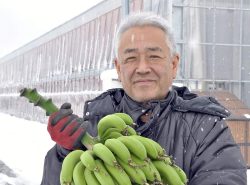
Dog farmers shout slogans during a rally against the government-led dog meat banning bill in front of the presidential office in Seoul, South Korea on Nov. 30, 2023. The letters read “Guarantee the right to life and freedom of choice of occupation.”
14:48 JST, September 27, 2024
SEOUL, South Korea (AP) — South Korea announced plans Thursday to compensate farmers and others in the country’s dwindling dog meat industry before a formal ban goes into effect in 2027, a move that is drawing opposition from both farmers and some animal rights activists.
South Korea’s parliament passed a landmark bill in January that will ban slaughtering, breeding or selling dog meat for human consumption after a three-year grace period. It will be punishable by 2-3 years in prison.
The Agriculture Ministry said that farmers would receive compensation starting from 225,000 won ($170), and rising up to 600,000 won ($450) per dog if they agree to shut down their businesses early.
An association of farmers rejected the offer, saying in a statement that they cannot relinquish their dogs for such low prices. Farmers earlier called for 2 million won ($1,505) per dog. They’ve said the ban infringes on their right to choose their own jobs and will aggravate their economic difficulties.
The association said that farmers will keep fighting even if they end up being jailed. Earlier in the week, they called for the law to be amended to extend the grace period and add appropriate compensation plans.
Sangkyung Lee, a campaign manager at the Korean office of the anti-animal cruelty group Humane Society International, called the South Korean announcement “an important milestone in this historic ban that will see the ban through to completion and end our country’s dog meat era for good.”
But Lee said his office is disappointed at the South Korean plan because it would pay farmers based on the number of dogs they have, “potentially increasing dog breeding to get more money from the scheme and more puppies being born into suffering.”
The Korean Animal Welfare Association, a Seoul-based animal rights group, said that local governments must strictly monitor farms to prevent them from increasing their number of dogs through breeding. It praised the government for trying to take reasonable steps to phase out the industry but criticized farmers for seeking excessive compensation.
Dog meat consumption is a centuries-old practice on the Korean Peninsula. It’s also eaten in China, Vietnam, Indonesia and some African countries. But South Korea’s dog meat industry has drawn more attention because of the country’s reputation as a cultural and economic powerhouse. It’s also the only nation with industrial-scale dog farms.
South Korea’s anti-dog meat campaign received a big boost from the country’s first lady, Kim Keon Hee, who repeatedly expressed her support for a prohibition. She was subjected to withering criticism and crude insults during demonstrations by farmers.
Surveys have found that around one in three South Koreans opposes the ban, though most people now don’t eat dog meat.
Vice Agriculture Minister Park Beomsu told reporters that government studies found that about 466,000 dogs are currently being raised for food across South Korea. He said officials will try to convince farmers to voluntarily phase out dog breeding ahead of the ban.
After the ban comes into force, Park said, the government plans to facilitate adoptions for the remaining dogs or move them to care facilities rather than euthanize them.
The agriculture ministry said butchers will also be compensated, while local authorities will be responsible for dismantling dog farms and slaughterhouses. Former farmers and butchers will also get low-interests loans if they pivot to other agricultural businesses.
The ministry said authorities will also offer financial assistance to traders and restaurant owners to shut down their businesses and find new jobs.
Top Articles in News Services
-

Survey Shows False Election Info Perceived as True
-

Hong Kong Ex-Publisher Jimmy Lai’s Sentence Raises International Outcry as China Defends It
-

Japan’s Nikkei Stock Average Touches 58,000 as Yen, Jgbs Rally on Election Fallout (UPDATE 1)
-

Japan’s Nikkei Stock Average Falls as US-Iran Tensions Unsettle Investors (UPDATE 1)
-

Japan’s Nikkei Stock Average Rises on Tech Rally and Takaichi’s Spending Hopes (UPDATE 1)
JN ACCESS RANKING
-

Producer Behind Pop Group XG Arrested for Cocaine Possession
-

Japan PM Takaichi’s Cabinet Resigns en Masse
-

Man Infected with Measles Reportedly Dined at Restaurant in Tokyo Station
-

Israeli Ambassador to Japan Speaks about Japan’s Role in the Reconstruction of Gaza
-

Videos Plagiarized, Reposted with False Subtitles Claiming ‘Ryukyu Belongs to China’; Anti-China False Information Also Posted in Japan

























